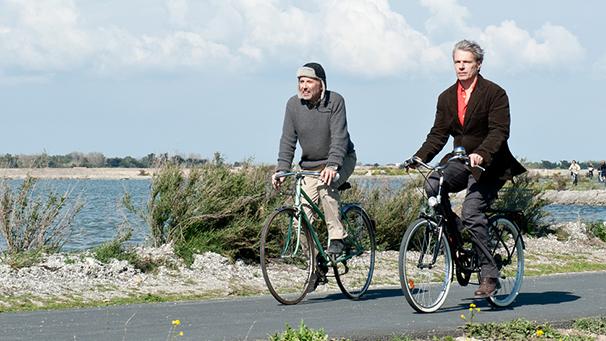
Philippe Le Guay’s “Bicycling with Molière,” or “Alceste à Bicyclette” in French, prominently features two friends who spend a great deal of time on bikes. However, the film is not a melodramatic portrayal of French friends who ride their bicycles together. In fact, it delivers a surprisingly sharp and poignant story that defies expectations.
Set on the sequestered Île-de-Ré, “Bicycling” brings Gauthier (Lambert Wilson) to the doorstep of his old friend Serge (Fabrice Luchini), a retired actor and part-time painter.
Gauthier, star of the French version of what “House” may have been had it been made by the creators of “Macgyver,” wishes to accomplish something of merit by starring in his own production of Molière’s “The Misanthrope.” He also seeks the cooperation of his long-retired friend to play alongside him.
Serge, an avid admirer and bona fide expert of Molière, is initially loath to return to the stage. Through Gauthier’s persistent entreaties, he yields and promises to deliver his friend an answer after one week of rehearsals. Trouble arises, however, when the egos of the two actors clash over who deserves the role of Alceste and who should take on the part of Philinte. Interpretations of the characters’ psyches diverge, personal habits interfere with artistic merit and a local Italian divorcée and a young, aspiring porn actress are thrown into the fray. All the while, the men ride their bikes.
Although at a glance one might mistake “Bicycling” as a run-of-the-mill dramedy in which two old friends reconcile their differences and address their own personal problems along the ride, it is in the writing and the culmination of the film that a truly powerful story is made.
Written by Luchini, a real-life Molière expert and avid bike rider, and Le Guay, the script brings the world alive with wit, philosophy and plenty of room for laughs.
The idea for the film was conceived when Le Guay travelled to seek out his friend Luchini, who was living on the Île-de-Ré. In biking to Luchini’s house, Le Guay found himself lost among the island’s marshes. There, Luchini came to his aid atop his own bicycle, and as the two rode home and the topic of Molière arose, Luchini began reciting “The Misanthrope” line for line as both Alceste and Philinte.
“Bicycling with Molière” showcases Le Guay’s second collaboration with Luchini — the first being “The Women on the 6th Floor” — and digs deep into the real nature of what it means to be a misanthrope. Heartfelt and smart, the film transcends any hackneyed expectations and catches viewers off guard as it so carefully hits home. It also leaves the audience with the desire to ride bicycles.
A version of this article appeared in the Tuesday, April 22 print edition. David Israeli is a staff writer. Email him at [email protected].




















































































































































